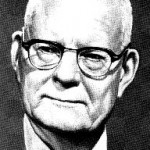Quality Requires Recall – Before Recalls
Posted on February 26, 2010
Filed Under Business | 2 Comments
Oh, my goodness. There was American statistician W. Edwards Deming addressing a group of Japanese industrialists in 1950, at the Mt. Hakone Conference Center, on the subject of statistical product quality administration, which had been introduced in the U.S. in the 1940s.
 “The knowledge and brains applied to statistics by the Japanese are an essential national resource; it is important in the same way as water power, forests, and railroads,” Dr. Deming told his attentive listenders, “And that statistical knowledge, much like water power, is not useful at all unless it has an impact on work opportunity and work (itself).”
“The knowledge and brains applied to statistics by the Japanese are an essential national resource; it is important in the same way as water power, forests, and railroads,” Dr. Deming told his attentive listenders, “And that statistical knowledge, much like water power, is not useful at all unless it has an impact on work opportunity and work (itself).”
There’s more: “However, no matter how excellent your technicians, you who are leaders, must strive for advances in the improvement of product quality and uniformity if your technicians are to be able to make improvements. The first step, therefore, belongs with management,” Dr. Deming told those Japanese executives. “First, your company technicians and your factories must know that you have a fervor for advancing product quality and uniformity and a sense of responsibility for product quality.”
All the apologies we have been hearing from Toyota executives of late would not have been necessary if they had kept Dr. Deming’s words before them. It’s profoundly interesting that the quality movement that Dr. Deming’s 1950 lectures spurred in Japan did not take hold in the U.S. until the 1980s, when Dr. Deming had to be “discovered” by NBC television at his home in Bethesda, Md. By then, Japanese attention to quality was almost legendary, but it always depended, and continues to depend, on management’s commitment to its principles.
So, when you have James Treece, of Automotive News, a veteran Toyota observer, noting that “Toyota has a deep preference for secrecy rather than openness,” which produces “arrogance, complacency, and understaffing,” you realize the importance not only of initial learning, but of learning that’s continually reinforced by alert executive leadership.
Dr. Deming had been invited to Japan by General MacArthur to help with the 1951 Japanese census. He found Japanese business executives despairing that they would never be known for producing anything but junk. When he encountered some Japanese statisticians interested in promoting quality control, he rallied them. Next, their managers.
“In the last ten years,” Dr. Deming continued in his Mt. Hakone talk, “there has been no scientific method which has experienced such rapid expansion as has statistical theory. In the context of today’s Japan, the most useful thing for manufacturers could be nothing but the appropriate application of statistical techniques.”
The rest became Japanese and world industrial history – and dismay, when a company like Toyota overlooks quality’s grounding principles – awareness, persistence and honesty. (Such as trending consumer complaints of acceleration problems, and responding to them promptly.)
Quality principles don’t have to be reinvented; they have to be recalled and remembered. – Doug Bedell
My Shrinking World
Posted on February 23, 2010
Filed Under The Writing Life | Leave a Comment
Just a week or so ago I was thinking about some travel. I have friends in Missouri I haven’t seen in ages, and I’d really like to get back to Salt Lake City. I used to live a few hours away and I always enjoyed that city. With my current writing project wrapping up in a month or so and only some vague outlines of where the next one will be, it seemed like the perfect time for a road trip.
Then I spent a good chunk of last Saturday in the ER. Why is not important. Suffice it to say that until things get sorted out, alone on the road a thousand miles from home and loved ones seems suddenly less attractive.
I think about my situation and can’t help but draw some contrasts. My son is studying in Europe and as I write this he is between semesters and on a month-long adventure: Istanbul, Vienna, Berlin, Cologne, Dresden, Hamburg, Leipzig, and more. With my money and his rail pass, his world is very large indeed…thousands of miles. My mother died of Alzheimer’s disease, and in the last year of her life her world was measured in feet… a very few feet.
I intend to rage against my shrinking world. Bold talk from a guy who a few days ago was hoping to have the chance to make the two-mile trip back home. I wonder if I’ll have the courage to venture far from the illusory safety of a shrunken world? – Dennis Owen
Lost Jobs Aren’t Being Replaced
Posted on February 23, 2010
Filed Under Technology | 1 Comment
Truly ominous confirmation of our post on ebbing U.S. innovation comes from a New York Times article, “Millions of Unemployed Face Years Without Jobs.”
How is The Times able to deliver this news of the “new poor”? A consensus is developing among economists that the recovery from this recession “will leave more people behind than in past recessions, failing to create jobs in sufficient numbers to absorb the record-setting ranks of the long-term unemployed.”
 And that has much to do with the lagging U.S. rate of development in science and technology, along with turning technological thinking into new U.S.-based businesses and jobs.
And that has much to do with the lagging U.S. rate of development in science and technology, along with turning technological thinking into new U.S.-based businesses and jobs.
There are now 6.3 million Americans who have been unemployed for six months or longer, “the largest number since the government began keeping track in 1948. That is more than double the toll in the next-worst period, in the early 1980s.”
Schools, colleges and workplaces that are unable to attract more young people into science and technology will see them, instead, waiting haplessly on unemployment lines. This is a truly frightening prospect, the dark side of the American dream when it falters.
“Every downturn,” notes The Times, “pushes some people out of the middle class before the economy resumes expanding. Most recover. Many prosper. But some economists worry that this time could be different. An unusual constellation of forces — some embedded in the modern-day economy, others unique to this wrenching recession — might make it especially difficult for those out of work to find their way back to their middle-class lives.”
We have exported job opportunities and are losing our technological edge against the countries where those jobs have gone. Truly a double whammy, unless we start thinking Sputnik-like and figure out how to do more technically-grounded work at home. We need a renewed job market, and it won’t come quickly. – Doug Bedell
U.S. Ebbing in Science and Engineering
Posted on February 22, 2010
Filed Under Technology | 1 Comment
Are we gaining or losing ground in science and engineering, key sources of innovation and that quintessential American ideal, progress? Either way, by how much?
Not easy to tell, you say? Nothing more than a hunch would be involved? Maybe so…unless you dig into the recently released Science and Engineering Indicators 2010. The National Science Board (NSB) – the governing body for the National Science Foundation (NSF) and NSF’s Division of Science resources Statistics – works this report up every two years.
 (We’re indebted to ThomasNet for bringing the NSF report to our attention on its Industry Market Trends (IMT) blog. IMT is a great place to keep abreast of trends in engineering – projects, education, funding and other key material.)
(We’re indebted to ThomasNet for bringing the NSF report to our attention on its Industry Market Trends (IMT) blog. IMT is a great place to keep abreast of trends in engineering – projects, education, funding and other key material.)
Unfortunately, the NSF report verifies that, what to many of us is a hunch, is actually a worrisome reality. “The latest edition indicates that while the state of U.S. science and engineering is strong, ‘U.S. dominance has eroded significantly’ in recent years, due in large part to rapidly increasing capabilities among Asian nations, particularly China, Kei Koizumi, assistant director for federal R&D in President Obama’s Office of Science and Technology Policy, said in an announcement of the findings.”
“‘The data begin to tell a worrisome story,'” Koizumi said.
The findings are listed in greater detail on the ThomasNet blog. But they include a declining U.S. share of R&D activity, lagging student interest in studying natural sciences and engineering, and impressive increases in entry-level natural sciences and engineering degrees in the developing world, including China (leading, of course).
From a U.S. perspective, the trends aren’t great, either, in science and engineering doctorates, research articles published and U.S. patents awarded to foreign inventors.
It does appear, though, that a “large proportion” of the foreign Ph.D. recipients at U.S. universities will stay here, if we keep encouraging them to do so. “Sixty percent of temporary visa holders who had earned a U.S. science and engineering Ph.D. in 1997 were gainfully employed in the U.S in 2007, the highest 10-year stay rate ever observed.”
We all have our own notions of what’s diverting American youngsters from the sciences and engineering– often, it seems, from concentrating notably anywhere at all. (Except, apparently, in Olympic sports.) But if the momentum that science and engineering give our economy is to pick up, educators, parents and employers need to become familiar with what’s occurring at U.S. schools and help them renew the appeal of rigorous subjects like math, science and engineering. – Doug Bedell
The Latest Airship Vision – an Elegant Floating Hotel
Posted on February 15, 2010
Filed Under Technology | 1 Comment
We’re still imagining new ways to float through the skies in airships. Korean Samsung Construction and Trading (Samsung C&T) is investing in the Seymourpowell Aircruise to further its interest in exotic materials.
Exotic this airship surely is – much more, for instance, than a dirigible with a cabin suspended below. “The initial design,” says a Seymourpowell.com release, “proposes a bar/lounge zone, four duplex apartments, a penthouse and five smaller apartments.” It would be a hotel in the skies, traveling leisurely across oceans or wherever its “residents” wanted to go.
 Whether it will ever be reach commercial scale is doubtful, says the MetalMiner blog. But dreams and visions don’t necessarily have to be scaled-up – the Aircruise already exists in this YouTube video. (The lovely accompanying music, alone, will transport you.)
Whether it will ever be reach commercial scale is doubtful, says the MetalMiner blog. But dreams and visions don’t necessarily have to be scaled-up – the Aircruise already exists in this YouTube video. (The lovely accompanying music, alone, will transport you.)
There is something entirely peaceful and benign, if very expensive, about this craft, which would be lifted by hydrogen and powered by solar energy. The details are in the links included here. The vision, as always with visions, is what matters most. – Doug Bedell
What Toyota Apparently Forgot
Posted on February 11, 2010
Filed Under Business | Leave a Comment
Strange what gets in the way of cultural and business history and learning. In the 1980’s, Japan was the only overseas nation that took General Public Utilities (GPU) up on its offer to participate in the cleanup of Three Mile Island Unit 2 and learn from it. The Japanese impressed us at TMI as avid learners, a quality we assumed spread across their industrial culture.
Yet what has Toyota possibly overlooked about corporate risks? Not only some of the finer points of industrial quality control, it appears, but of crisis communication as well – factors that the Japanese engineers at TMI observed fairly closely.
 Remember that workers on a Japanese assembly line – gemba crews – can stop the line at will whenever they observe a quality lapse. But suppose the issue is more subtle, not readily apparent to production workers? Where was the engineering attentiveness to possible acceleration problems? And in crisis terms, why did it take Toyota months to acknowledge it had a safety problem it should have advised its customers about?
Remember that workers on a Japanese assembly line – gemba crews – can stop the line at will whenever they observe a quality lapse. But suppose the issue is more subtle, not readily apparent to production workers? Where was the engineering attentiveness to possible acceleration problems? And in crisis terms, why did it take Toyota months to acknowledge it had a safety problem it should have advised its customers about?
Writing for Business Week, Jeffrey Liker, an author of six books about Toyota, says concerns about its apparent quality lapses are overdone. We hope he’s right. Yet something is amiss when concerns over a corporation’s responsiveness balloon to the point of threatening its survival.
It’s not just the ability to take safety issues seriously at the highest levels that matters, but to act promptly and effectively on them once they’re recognized. No matter how vaunted an organization may be, sloppiness can creep in. Procedures to avoid that have to be maintained. Management needs always to be attentive and candid.
The 1979 accident at Three Mile Island Unit 2 wasn’t as threatening to the public as it was initially perceived, either. Yet, because of the ineffective manner in which it was experienced and communicated in its early stages, the Unit 2 accident caused a lack of confidence that produced a 30-year U.S. nuclear power stalemate. The Japanese at TMI undoubtedly took an awareness of what was unfolding there home with them. We’re left wondering, though, how deeply it influenced their business culture overall.
Toyota’s cars are fueled by public confidence that, fairly or not, seems suddenly in jeopardy. Public support can be lost, just like that. Must a lesson so dire be learned repeatedly? – Doug Bedell
My Wine Experiment
Posted on February 9, 2010
Filed Under Technology | 1 Comment
I enjoy wine. But being a graduate of FPU I’m a cheapskate at heart. It’s particularly disheartening to spend my hard earned dollars on an untried bottle and then be disappointed. This means that—given the vast world of wine out there—I tend to be unadventurous and stick with the familiar… boring!
Some recent reading about a relatively new company called First Flavor has prompted me to embark on a simple experiment. First Flavor manufactures taste strips for consumer products in an effort to give customers a point-of-purchase opportunity to taste their clients’ wares. Rum, vodka, tequila, smoothies, fruit drinks, and toothpaste taste strips are among their offerings… why not wine?
Aficionados will laugh at the notion that the subtle characteristics of fine wine will translate to a paper (or other edible substrate) you pop in your mouth. Probably, but to an engineer it is certainly worthy of a quick and dirty experiment. My first stop was a research article on brain response to odor and taste, which gives a little insight into preparing such strips. Next I need to find edible paper for the substrate… hmm, do I have to order rice paper from China? Instead I try the next best thing, and sure enough, I can order edible paper from Amazon! (Books, DVDs, iPods, and edible paper… makes perfect sense to me.)
 Now the wine. Well it turns out I have a cousin in California who is one of the state’s premier growers of hard-to-find Iberian (mainly Portuguese) wine grapes. Ron, if you are reading this air freight a case of Alta Mesa Verdelho and Tempranillo ASAP… it’s tax deductible as an R&D expense. After preparing some taste strips and checking them against the real thing (eat a taste strip drink a case, eat another taste strip drink another case, etc.) I’ll report back. Stay tuned. – Dennis Owen
Now the wine. Well it turns out I have a cousin in California who is one of the state’s premier growers of hard-to-find Iberian (mainly Portuguese) wine grapes. Ron, if you are reading this air freight a case of Alta Mesa Verdelho and Tempranillo ASAP… it’s tax deductible as an R&D expense. After preparing some taste strips and checking them against the real thing (eat a taste strip drink a case, eat another taste strip drink another case, etc.) I’ll report back. Stay tuned. – Dennis Owen
Robots Gaining in ‘Muscles,’ Dexterity
Posted on February 9, 2010
Filed Under Technology | 1 Comment
They’re not yet Captain Marvel but, by gosh, they’re getting close, at least in their upper bodies. New industrial robots being developed jointly by NASA and General Motors have amazing dexterity in their arms and even their fingers.
NASA and GM are working together on this next generation of robots because they have applications both for exploring space and building cars. They’re called Robonaut 2, or R2. The original Robonaut is 10 years old now.
 R2 looks almost musclebound. It can lift 20 pounds with each arm, “about four times that of other humanoid robots,” says NASA. Robots have long been used in the auto industry, of course. Perhaps at some point Robonaut 2 could be introduced to Ford’s RUTH, which does interior work on Ford vehicles, but so far without having a humanoid look. I wonder what that mating might yield?
R2 looks almost musclebound. It can lift 20 pounds with each arm, “about four times that of other humanoid robots,” says NASA. Robots have long been used in the auto industry, of course. Perhaps at some point Robonaut 2 could be introduced to Ford’s RUTH, which does interior work on Ford vehicles, but so far without having a humanoid look. I wonder what that mating might yield?
R2’s “legs” at this point may be only a pedestal. But who knows about future generations and what their builders might need in terms of robotic assistance – like hiking on the moon or mars.
Robonaut is an impressive contrast to some earlier industrial robots of which we have first- hand knowledge. In the 1980s and ’90s we were involved in the recovery program for the Three Mile Island Unit 2 nuclear power plant after the 1979 accident there. Several robots were developed to deal with cleanup and disassembly tasks in high radiation areas unsafe for human work. Most of those were designed and built at the Robitics Institute at Cernegie Mellon University under the direction of the brilliant William (Red) Whittaker, or at his spinoff company RedZone Robotics. By today’s standards they were rather primitive beasts (see photo nearby).  Some were quite successful (reactor internals disassembly) while others were largely expensive failures (removing radioactive sludge from the reactor building basement).
Some were quite successful (reactor internals disassembly) while others were largely expensive failures (removing radioactive sludge from the reactor building basement).
Nonetheless, these and thousands of others are all part of the robot lineage that have taken us to Robonaut 2, RUTH, and more. Like the Apollo astronauts, when Robonaut’s descendants walk on Mars, we wonder if they will use their telescopic vision to look at a pinpoint of light in the heavens and dream of home. – Doug Bedell
Suppose Your Were the Last of Your Kind
Posted on February 5, 2010
Filed Under Business | Leave a Comment
Picture yourself as the last living representative of your craft or business. What state would you want to leave them in for whomever else might be interested in your life’s role?
Such epochal thoughts occurred to us in reading about the passing of Boa Sr in the Andaman Islands, the last living member of one of the world’s oldest tribal cultures.
Where are the Andaman Islands? They’re out in the Bay of Bengal, not too far from India, which governs them. But no matter where Boa Sr, or you, were or are located, the idea of being the last living representative of a culture stirs us.
 Boa Sr lived through a tsunami and the Japanese occupation of her homeland and was the last native in her island chain who was fluent in Bo, a 65,000-year-old. originally Neolithic (New Stone Age) culture. For several years until she died recently, she had no one else to speak her native language to. (Bo is one of 10 Great Adamanese languages.)
Boa Sr lived through a tsunami and the Japanese occupation of her homeland and was the last native in her island chain who was fluent in Bo, a 65,000-year-old. originally Neolithic (New Stone Age) culture. For several years until she died recently, she had no one else to speak her native language to. (Bo is one of 10 Great Adamanese languages.)
So, you may ask, suppose we were the last living representatives of our culture, craft or way of life? What imprint would we be leaving on history’s parchment? An idle question? Not at all. For we will be leaving a recollection of who we were, and how we dealt with others, among our friends and associates, at least.
There’s something especially poignant about noting the passing of Boa Sr, for she was the last of an entire culture. Until roads were built in the 1970s, her Adamanese people resisted colonizers and missionaries from the forests of their homeland. We don’t live in forests, but what culture, what accomplishments, what imprint are we creating for posterity to recall?
Boa Sr’s death reminds us that this isn’t a playful question. It’s a cultural one, involving the culture that we’re creating and, one day, will be leaving, too. Like Boa Sr, we are all, in our own settings, aspects of a creation that keeps passing and recreating itself. With other players, or maybe none. – Doug Bedell
Evolutionary Superiority
Posted on February 4, 2010
Filed Under Business | 2 Comments
Evolutionary Superiority, now that’s a powerful phrase… wouldn’t it make you feel puffed up to be able to apply that description to yourself? My friend, colleague, and fellow Insights blogger, Doug Bedell, has found some primate research from Harvard University that suggests that if you have one of the more annoying human traits—grumpiness—then you may qualify as evolutionarily superior.
The details are here, but basically the idea is that ape species that can set aside their natural tendency for playfulness now and again and get pissed off about something (chimpanzees) are more civilized and accomplished than their always playful peers (bonobos). I have to say I’m skeptical about applying this research to human evolution, but I’ve seen first hand how this research applies to life in the business world.
In large, hierarchical, and highly structured organizations I’ve worked with (think government agencies), too many workers go along to get along, and consequently things (processes, systems, rules, databases, paperwork, whatever) evolve slowly, if at all. It takes the rare grumpy man or woman (read that as annoyed, impatient, and “I’m mad as hell and I’m not going to take this anymore”*) to force change and make the organization evolve in some small way. I contrast that with some of the more  sharp, nimble, and evolve-or-die companies I’ve written for, which seem to be full of impatient and grumpy (but not uncivilized) people who are frequently unsatisfied and want things changed… now!.
sharp, nimble, and evolve-or-die companies I’ve written for, which seem to be full of impatient and grumpy (but not uncivilized) people who are frequently unsatisfied and want things changed… now!.
The next time a colleague annoys you with a stubborn, grumpy, and get-with-the-program attitude, give him or her a hug (to hell with political correctness and harassment policies). They may be saving your career. – Dennis Owen
* Thanks to dailymotion.com
keep looking »Recently
- Presentations With Forethought
- Technical Writing’s Lineage – Surely It’s Deeper than Digital
- At the Holidays, Twitting Amazon
- Successful Cookie Baking – From Mom, an Acknowledged Expert
- Slides for a Tech Writer’s Craft
- Digital or Not, Be Clear
- Being Watchful About Digital Designs…
- When Proposals Don’t Click, Keep Making Them Anyway
- Like a Good Gardener, Help an Enterprise Keep Itself Current
- We’re Leaders All, And Need to Think That Way
Categories
Archives
- January 2017
- December 2016
- November 2016
- October 2016
- September 2016
- August 2016
- July 2016
- June 2016
- May 2016
- April 2016
- March 2016
- February 2016
- January 2016
- December 2015
- November 2015
- October 2015
- September 2015
- August 2015
- July 2015
- June 2015
- May 2015
- April 2015
- March 2015
- February 2015
- January 2015
- December 2014
- November 2014
- October 2014
- March 2014
- February 2014
- January 2014
- December 2013
- November 2013
- October 2013
- September 2013
- August 2013
- July 2013
- June 2013
- May 2013
- April 2013
- March 2013
- February 2013
- January 2013
- December 2012
- November 2012
- October 2012
- September 2012
- August 2012
- July 2012
- June 2012
- May 2012
- April 2012
- March 2012
- February 2012
- January 2012
- December 2011
- November 2011
- October 2011
- September 2011
- August 2011
- July 2011
- June 2011
- May 2011
- April 2011
- March 2011
- February 2011
- January 2011
- December 2010
- November 2010
- October 2010
- September 2010
- August 2010
- July 2010
- June 2010
- May 2010
- April 2010
- March 2010
- February 2010
- January 2010